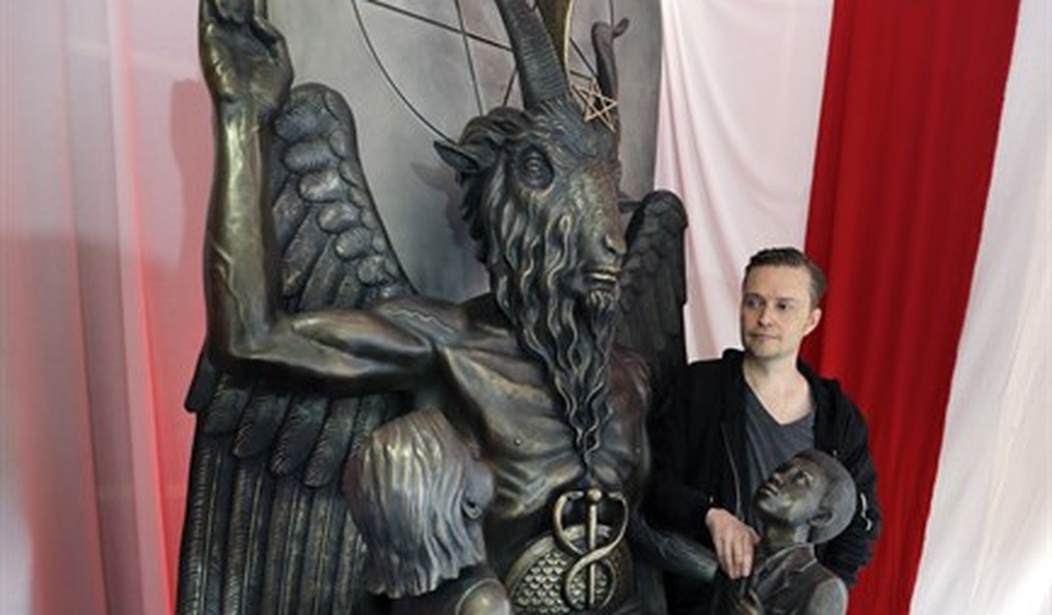A Mississippi man took issue with a "holiday display" last December featuring a statue of the pagan god Baphomet at the Iowa State Capitol building and destroyed it.
Baphomet is often worshipped as a pagan deity by Satanists.
Michael Cassidy, a former candidate for Congress in Mississippi, was charged the next day with fourth-degree criminal mischief, which is a misdemeanor. He told the conservative site The Sentinel, “My conscience is held captive to the word of God, not to bureaucratic decree. And so I acted.”
After that, the Polk County prosecutor in Iowa decided to throw the book at Cassidy, charging him with "felony third-degree criminal mischief and notes that the act was committed 'in violation of individual rights' under Iowa's hate crime statute," according to the Des Moines Register.
"Evidence shows the defendant made statements to law enforcement and the public indicating he destroyed the property because of the victim’s religion," triggering the violation of individual rights enhancement, said Lynn Hicks, a spokesman for the Polk County Attorney's Office.
The "victim's religion"? What religion would that be?
"Satanism" is not one religion. There are "religious" Satanists, "philosophical" Satanists, Satanists who worship Lucifer, and Satanists who don't worship Lucifer. Which one is a bona fide, recognized religion that would necessitate "hate crime charges" for destroying a display?
Cassidy's attorney, Sara Pasquale, declined to comment Tuesday on the new charge. In previous court filings, she has accused the Satanic Temple of making premature filings that, "like the timing and substance of the Satanic Temple of Iowa’s installation of a demonic statue in the capitol building... are only meant to evoke strong emotions and incite others."
True dat.
In the 1990s, a Supreme Court case brought the issue of whether Satanism is a religion before the court.
In Carpenter v. Wilkinson, the court deals with a lawsuit by a prisoner who was denied access to a Satanic Bible while incarcerated. While the court ends up deciding the case on other grounds, it goes into great detail about the contours of religious liberty. The court’s analysis begins by admitting that “Deciding what is ‘religious’ or what constitutes a ‘religion’ is a very delicate undertaking, especially where the claimed ‘religious’ beliefs fall outside what is commonly thought of as mainstream religion.” At the same time, the court knows that there cannot be a “blanket privilege” to create any set of beliefs justifying one to conduct himself however he pleases, and call it a protected religion. Thus the court is stuck between religious relativism and the anarchy that would result if it actually allowed that relativism to play out.
It's a valid point. Suppose someone wanted to worship a block of wood or a stone. Simply declaring it a religion doesn't make it one.
And what about the prosecutor bringing charges in this case? Isn't he only looking for publicity in order to evoke "strong emotions"?
For our purposes, the most interesting part of the Carpenter case is the admitted shift in the court’s understanding of religion. Since the Constitution does not define religion, the court “must turn to case law for guidance.” The court begins by noting that early Supreme Court precedent “defined religion in traditional theistic terms.” Keep this in mind, because for the originalist, this should largely be the end of the analysis. The court goes on to state, however, that over time the standard expanded to include unorthodox religions and even belief systems that are non-theistic.
I'm no expert, but I think Mr. Cassidy has a good shot of winning his case by appealing the idea that Satanism is a religion at all. There's even a "test" the court came up with in the Carpenter case to determine if there's a legitimate religious case to be made.
There are two important concepts that rebut the idea that Satanism is protected by the Free Exercise Clause of the First Amendment. First, anti-blasphemy laws were consistently upheld as compatible with free exercise of religion: According to the Harvard Law Review, “the blackletter rule was clear. Constitutional liberty entailed a right to articulate views on religion, but not a right to commit blasphemy — the offense of ‘maliciously reviling God,’ which encompassed “profane ridicule of Christ.’” Throughout the nation’s history and even into the twentieth century, the federal courts have consistently upheld state anti-blasphemy laws as constitutional. There is no binding precedent stating that anti-blasphemy laws violate the First Amendment.
I certainly hope that Mr. Cassidy isn't charged beyond the original charges of fourth-degree criminal mischief. That would be a misdemeanor and would probably result in a fine and nothing more.










Join the conversation as a VIP Member